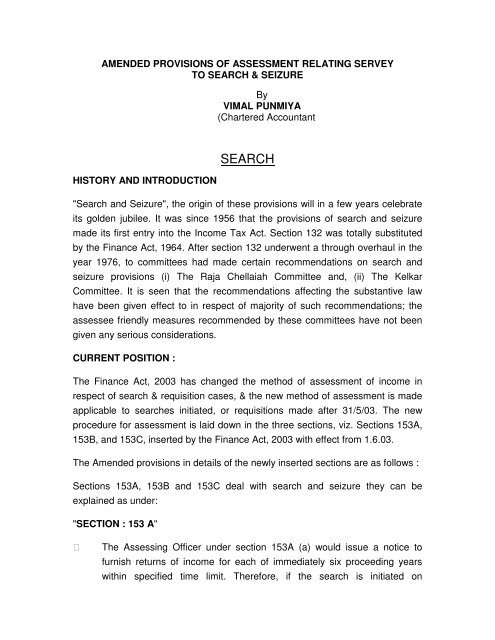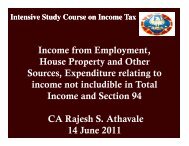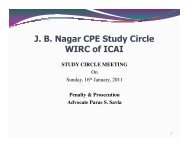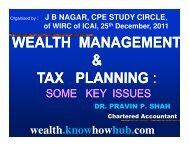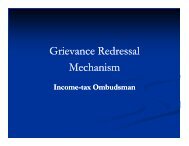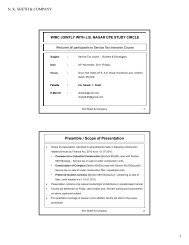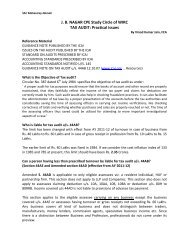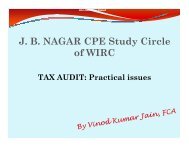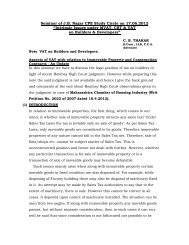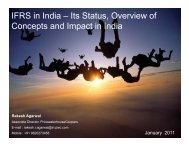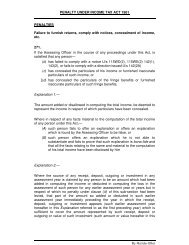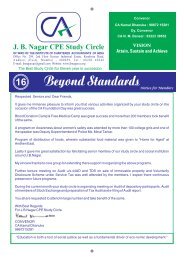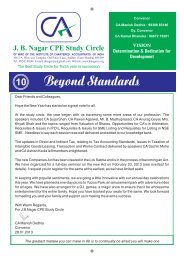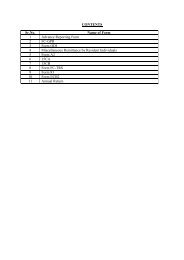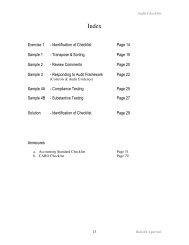search servey and seizure
search servey and seizure
search servey and seizure
Create successful ePaper yourself
Turn your PDF publications into a flip-book with our unique Google optimized e-Paper software.
AMENDED PROVISIONS OF ASSESSMENT RELATING SERVEYTO SEARCH & SEIZUREByVIMAL PUNMIYA(Chartered AccountantSEARCHHISTORY AND INTRODUCTION"Search <strong>and</strong> Seizure", the origin of these provisions will in a few years celebrateits golden jubilee. It was since 1956 that the provisions of <strong>search</strong> <strong>and</strong> <strong>seizure</strong>made its first entry into the Income Tax Act. Section 132 was totally substitutedby the Finance Act, 1964. After section 132 underwent a through overhaul in theyear 1976, to committees had made certain recommendations on <strong>search</strong> <strong>and</strong><strong>seizure</strong> provisions (i) The Raja Chellaiah Committee <strong>and</strong>, (ii) The KelkarCommittee. It is seen that the recommendations affecting the substantive lawhave been given effect to in respect of majority of such recommendations; theassessee friendly measures recommended by these committees have not beengiven any serious considerations.CURRENT POSITION :The Finance Act, 2003 has changed the method of assessment of income inrespect of <strong>search</strong> & requisition cases, & the new method of assessment is madeapplicable to <strong>search</strong>es initiated, or requisitions made after 31/5/03. The newprocedure for assessment is laid down in the three sections, viz. Sections 153A,153B, <strong>and</strong> 153C, inserted by the Finance Act, 2003 with effect from 1.6.03.The Amended provisions in details of the newly inserted sections are as follows :Sections 153A, 153B <strong>and</strong> 153C deal with <strong>search</strong> <strong>and</strong> <strong>seizure</strong> they can beexplained as under:"SECTION : 153 A"The Assessing Officer under section 153A (a) would issue a notice tofurnish returns of income for each of immediately six proceeding yearswithin specified time limit. Therefore, if the <strong>search</strong> is initiated on
1/12/2007, the assessee can be called upto to file returns for the A. Y2002-03 to 2007-2008. (i.e previous years 1/4/2001 to 31/3/2007).Thereby the assessee will have to file separate returns for each of theyears in the prescribed form within the time limit specified in the notice.Further there is no provision for giving any maximum time limit for filing thereturns.The notice issued under provision 153A can be issued even if theconditions laid down in sections 147 to 149,151 <strong>and</strong> 153 are not satisfied.We can interpret then ,that even if 4 years from the end of the assessmentyear, for which sections 143(3) has been made, had expired <strong>and</strong> theassessee had disclosed all material facts at the original assessment forthe year, notice u/s 153A can be issued for that year. In normalcircumstances such notice for reassessment cannot be issued u/s 148 inview of the provision to section 147.With regards to the year(s) in respect of which the assessment or reassessmentis pending, as per the second proviso to section 153A (b), thesame shall abate. In other words, the assessment or re-assessment shallnot be made by regular assessment under section 143(3) or reassessmentunder section 143, but it shall be under section 153A(b). If thereturns are filled, the Assessing Officer shall re-assess the income undersection 153A (b) in respect of the year(s) in respect of which theassessment is complete. Thus, the assessee will have to include theincome already assessed earlier or income declared in the returns forwhich assessments are pending in the respective years while filing returnsfor the above 6 years for which notice u/s 153A is issued. If no returns arefiled, the Assessing Officer shall proceed to make assessment undersection 144."SECTION : 153 B"Under section 153B the assessment proceeding shall be completed withina period of two years from end of the financial year in which last of theauthorization of the <strong>search</strong> was executed. Provisions have been made forextending this time limit where special tax audit u/s 142(2A) has been
ordered or where stay order by court has been issued or in similarcircumstances."SECTION : 153 C"Sections 153C states that, if during the course of the <strong>search</strong> it is noticedthat any books of accounts, documents, assets etc: are found or seizedbelonging to any other person, the Assessing Officer shall transfer thesame to the officer who has jurisdiction over that other person <strong>and</strong> thenofficer shall proceed against that other person as provided in section 153A<strong>and</strong> 153B."SECTION : 234 A AND 234 B"The provisions of section 234A <strong>and</strong> 234B for levy of interest on thedem<strong>and</strong> raised under the above proceedings will apply. Therefore, theassessee who is subjected to assessment or reassessment u/s 153A,153B <strong>and</strong> 153C will have to pay interest for the delay in filing the return ofincome <strong>and</strong> short fall in payment of advance tax at the applicable rates foreach of the above six years."SECTION : 271"With regards to the provisions of section 271 for the levy of penalty forconcealment of income will also apply <strong>and</strong> penalty will range between100% to 300% of tax which can also be levied."SECTION : 276 CC"It should be noted here that the provisions for prosecution u/s 276CC willbe applicable when the assessments are made u/s 153A, 153B <strong>and</strong> 153C."SECTION : 246A"The Finance Act, 2003 has amended section 246A so that the assesseecan file an appeal to the C1T (A) against the order of assessment or reassessmentunder the above section. Further an appeal to the ITATribunal can also be filed against the order of CIT (A). Also appeals toHigh Court on substantial question of law can also be filed.
"RIGHTS OF ASSESSEE DURING CONDUCT OF SEARCH :"Q. 1 What remedy does the assessee have in case of misbehaviour of theofficers?Ans. Misbehaviour may lead to some injury, damage or harm to the interest ofthe assessee or his reputation or it may only hurt his feelings <strong>and</strong>sentiments, religious or otherwise, Depending on facts, the action will lieby way of challenge of the proceedings under article 226 if the <strong>search</strong> isdone in an irregular <strong>and</strong> illegal manner. If it is a case of misbehaviourleading to hurt of sentiments <strong>and</strong> feelings, the best course would be tolodge a complaint with the Director or Commissioner concerned or withthe Director General or Chief Commissioner concerned or with theMember (Investigation), In extreme cases, the action may lie in TORTS.There, of course, it will have to be established that it was covered by theimmunity of sovereign act.Q. 2 What remedies’ does the assessee have where during <strong>search</strong> the assetsare destroyed like sofas <strong>and</strong> beds’ are torn, floor is dug <strong>and</strong> walls arebroken?Ans. No remcdy lies against such actions if they are done bona fide <strong>and</strong> ingood faith in carrying out the object of the <strong>search</strong>. Action may lie only ifthese acts are done mala fide <strong>and</strong> there was no reason to suspect thatitems broken or destroyed contained any concealed income or assetshidden therein. Neither on the basis of information received from theinformer, nor from any other source.Q. 3 Can the assessee contract superior officer when <strong>search</strong> is in progress toexplain the difficulties being faced?Ans. Yes, but the superior may not interfere with the judicial discretion of theauthorised officer, He may take administrative action <strong>and</strong> such correctivemeasures as may relieve the assessee of avoidable harassment <strong>and</strong> tomake the <strong>search</strong> operation less painful.Q. 4 Whether can a legal advisor be present? if, yes, he do when <strong>search</strong> is inprogress?
Ans. Yes, he can be present. :Q. 5 What remedy is available to a person whose cash has been seized fromthe possession of his employee who was carrying it in connection withbusiness?Ans. Such a person should immediately lodge his claim before the authorisedofficer who has seized the cash <strong>and</strong> produce necessary evidence toexplain the source. If the proceedings under section 132(5) have alreadybeen commenced, he should lodge his claim under section 132(7). In casehe does not succeed there also, he may file an appeal under section132(11) before the Commissioner.Q. 6 What remedy lies with regard to <strong>seizure</strong> of cash whose sources are alsoexplained?Ans. Efforts should first be made to prevent the <strong>seizure</strong> because once the<strong>seizure</strong> is made, Department may like to pass an order. If the cash iswrongly seized, or for that matter, any asset is wrongly seized, theauthorised officer should pass an order under section 154 to release suchan asset. Provisions of section 132(i) empower <strong>seizure</strong> of only suchassets, which represent fully or partly undisclosed income. Therefore,<strong>seizure</strong> of any assets, which does not satisfy the basic condition, involvesan illegality in the act of <strong>seizure</strong>, which should be corrected by the officeras if he has committed mistake of fact <strong>and</strong>/or of law apparent from record.Since this kind of <strong>seizure</strong> would be without jurisdiction, it will be a fit casefor filing a writ petition under article 226 of the Constitution.Q. 7 Can assessee ask for identity card of officers?Ans. Yes. Sometimes the authorised officers or the person accompanying themdo not possess the identity card. As an alternative, they should carry <strong>and</strong>produce some other documents to prove their identity, e.g, a certificateattesting their signatures, The certificate should be issued by a seniorofficer in charge of the <strong>search</strong> or by an immediate superior. In a casewhere there is no proof of identity, the assessee would be within his rightto refuse the ingress.
Q. 8 Can assessee ask for a copy of warrant?Ans. No. Warrant of authorisation is meant <strong>and</strong> addressed to the authoriscdofficer <strong>and</strong> it has to be executed by him. It is an instrument to arm him withthe authority to <strong>search</strong>. After execution of the warrant, it is to be returnedto the issuing authority. The assessee is, however, entitled to go throughthe warrant. In fact, the authorised officer is duty bound to produce it <strong>and</strong>in evidence of production thereof, he may obtain the signatures of theassessee or his representative along with the signatures of two witnesses.The assessee should inspect it carefully to see that: (a) it is not blank; (b)irrelevant portions are struck off, etc. If these defects are found, he shouldbring them on record by filing a letter before the authorised officer. If thewarrant is blank <strong>and</strong> the name <strong>and</strong> address is not correctly recorded, hemay as well not allow the ingress. In case of other defects, question ofchallenging the validity under article 226 may be considered.Q. 9 Can the authorised officer refuse permission to the assessee or any otherperson to be present on his behalf during <strong>search</strong>?Ans. No. Sub-rule (8) of rule 112 provides that the occupant of the building,place, vessel, vehicle or aircraft which is <strong>search</strong>ed, as also the person incharge of such vessel, etc., or any other person on his behalf, shall bepen-nitted to attend during the <strong>search</strong> <strong>and</strong> a copy of <strong>seizure</strong> memoprepared under sub rule (7) shall be delivered to the occupant or to suchother person.Q. 10 Can the authorised officer enter <strong>and</strong> <strong>search</strong> any building belonging to theassesee once the warrant of authorisation is issued against him?Ans. No, he can enter <strong>and</strong> <strong>search</strong> only such building in relation to which thewarrant of authorisation is specifically issued.Q. 11 Can the assessee call his relatives to assist him during the course of<strong>search</strong>?Ans. Yes, he can do so but the authorised officer may carry out their personal<strong>search</strong> before allowing them entry. However, he may order such personswho may be creating obstruction in the proper <strong>and</strong> smooth conduct of the
<strong>search</strong>, to leave the premises or he may not grant the permission if heapprehends any obstruction in the smooth conduct of the <strong>search</strong>proceedings.Q. 12 Can an authorised officer prevent the assessee from receiving or makingtelephone calls <strong>and</strong> telex messages?Ans. No, unless he believes that such permission will defeat the very object ofthe <strong>search</strong> <strong>and</strong> that the assessee may use his messages to fabricate falseevidence, remove the assets, or make other manipulation.Q. 13 Is it advisable to give answer to every question by saying, ‘I do notremember because of the confused state of my mind created due to thesudden raid'?Ans. It is neither advisable nor in the interest of the assessee to deliberatelyanswer every question by repeating “I do not remember” or “I do notknow”. He may lose the opportunity of explaining several items of assets,which he can otherwise do. Besides, he may run the risk of prosecution incase on the basis of contemporaneous evidence recovered subsequentlyduring the <strong>search</strong> it appears that the facts were within the knowledge ofthe assessee, which he declined to disclose. It would be on the otherh<strong>and</strong>, advisable to take the help of the books of account <strong>and</strong> otherdocuments <strong>and</strong> give all possible information, which is readily available.However, in genuine cases where it is not practicable to remember certainfacts with certainty or minute details of transactions particularly those ofseveral past years, the assessee may only explain their nature, if possible<strong>and</strong> add that he would be able to furnish the details <strong>and</strong> explanations afterlooking into record. A statement made on the spot in support of hisexplanation has greater evidentiary value.Q. 14 What remedy is available to a genuine depositor of the money when the<strong>search</strong> takes place against a person with whom the deposit is made, e.g.,with a car dealer with whom initial deposit of money is made for bookingthe car or with a moneylender with whom the ornament or jewellery maybe pawned as security for loan?
Ans. Proceedings with the presumption that the deposit is genuine <strong>and</strong> theassessee against whom the <strong>search</strong> proceedings are taken, is able toestablish its genuiness during the course of the <strong>search</strong> itself, any <strong>seizure</strong>or restraint of the deposit would be ab initio void, It is also well settled thateven the restraint under section 132(3) can be made only after theauthorised officer is satisfied that the asset, in question, wholly or partly, isconcealed income or wealth.Therefore, any <strong>seizure</strong> of a genuine or disclosed amount will be ‘withoutjurisdiction <strong>and</strong>, in any case, illegal. Therefore, the assessee <strong>and</strong>/or thedepositor can always approach the authorised officer either during thecourse of <strong>search</strong> itself with the necessary evidence <strong>and</strong> claim that no<strong>seizure</strong> is called for or they can approach the authorised officer even after<strong>seizure</strong>; but within 15 days of the time limit prescribed under section132(9A) to release the amount wrongly seizcd by rectifying the order of<strong>seizure</strong> under section 154. Release should be made in the presence oftwo witnesses.If the time limit of 15 days has expired <strong>and</strong> the seized assets have beenh<strong>and</strong>ed over to the Assessing Officer, the assessee <strong>and</strong>/or the depositorcan file writ under Article 226 on the ground that the <strong>seizure</strong> was withoutjurisdiction or, in any case, illegal, <strong>and</strong> that no further proceedings undersection 132(5) can be taken in respect of such assets. The depositor canalso approach the Assessing Officer during the course of proceedingsunder section 132(5) as a "concerned person", <strong>and</strong> put his claim forrelease of the amount or at best, to proceed against him under section132(7). If he does not succeed there, he can file an appeal before theCommissioner, where he will be entitled to raise all the grounds, includingthe question of validity of the <strong>search</strong> <strong>and</strong> <strong>seizure</strong> <strong>and</strong> claim the release ofthe assets.Answer to present question should not be mixed with the answer to theearlier question wherein it is said that no disclosure can be made by athird party during the course of <strong>search</strong>. The distinguishing factor is thatwhile in the present question, the <strong>seizure</strong> being of disclosed asset itself isillegal <strong>and</strong> without jurisdiction, in the earlier question the <strong>seizure</strong> is valid
<strong>and</strong> the question is as to who can make the disclosure <strong>and</strong> in whichproceedings?Q. 15 Can the assessee be arrested during the course of <strong>search</strong>?Ans. No, the authorised officer does not have the power to arrest an assesseefor an offence under the Income-tax Act or other Direct Tax Laws whileacting under section 132. However, in case of offences like destruction ofdocuments, attack on the <strong>search</strong> party, an authorised officer can lodge acomplaint with the police <strong>and</strong> the appropriate police authority may takecongnizance of the offence <strong>and</strong> order an arrest.DUTIES OF ASSESSEEQH. l Is the assessee expected to retain his bills for each item purchased?Ans. No, neither that is required nor practicable, particularly in relation to itemsof smaller value. It is, however, essential that there should be adequatewithdrawal to cover the acquisition of the articles during the year or overthe years as the case may be. Even under the CCS (CCA) Rules, aGovernment servant is supposed to intimate acquisition of movable assetsonly if the value exceeds Rs. 5,000. However, in case of valuable articles<strong>and</strong> things, it is advisable to keep the bills.QH. 2What documents are necessary to be maintained in relation to theimported items?Ans. If the imported items are brought by the assessee from abroad, he shouldmaintain its purchase voucher as well as the customs receipt. In case ofsmaller items which are covered by the exemption limit or as may beprevalent at the relevant time, no such formality is necessary. However, ifthese items are gifted by the friends visiting from abroad, it may benecessary to keep the details of their visiting from abroad, it may benecessary to keep the details of their visits <strong>and</strong> a letter from themevidencing the fact of gift as well as the payment of the customs dutysupported by the customs receipt unless they were minor items coveredunder exemption limit. In case the imported items are purchased fromsome other persons in India, it may be necessary to keep the customs
duty receipt evidencing the payment made by the original purchaser <strong>and</strong>also in a letter or a sale memo evidencing the sale.QH. 3 What evidence is needed to prove the wedding gifts?Ans. Now under the Dowry Act, it is essential to prepare a list of gifts of variousarticles received at the time of marriage. This is to be signed by both thesides <strong>and</strong> copies are to be exchanged. If this is done, it would be an usefulevidence in favour of the assessee. In other cases, one may follow theroutine of maintaining a list, to the extent possible, showing names ofdonors, amounts or articles gifted. In the case of costly gifts, the donorsmay be examined as to their source, etc."POINTS TO REMEMBER"The assessment officer is bound to issue notice for all the assessmentyears including the assessment years for which nothing is found <strong>and</strong>nothing is likely to be assessed as additional income over <strong>and</strong> above theincome already disclosed by the assessee. Thus, in this case, eventhough there cannot be any assessment, the Assessing officer is bound topass an order of assessment or reassessment as the case may be.The assessing officer would be in a position to make a fresh assessmenteven though an assessment or reassessment has been made <strong>and</strong> whichis not likely to be disturbed on account of the <strong>search</strong>.Section 132 has been amended with effect from 1/6/03 to provide that anybullion, jewellery, or other valuable article or thing being stock in tradeshall not be seized or put under prohibitory orders in <strong>search</strong> proceedings.The assessing officer would be in a position to make an assessment evenin respect of time-barred assessment. In other words, he would get freshlimitation period in respect of those assessment years.It is to be noted that any income of any assessment year can be assessedonly once. This principle being accepted <strong>and</strong> disputed has to be kept inmind for common assessment years. For Instance a <strong>search</strong> is carried onMarch 15, 2007 <strong>and</strong> concluded, lets assume on July 10, 2007. In thatcase, the specified period would be assessment years 2002-03 to 2007-08
<strong>and</strong> 1-4-2007 to 8-7-2007. Thus, the common assessment years are2002-03 to 2005-06.JUDICIAL POSITION IN OUR COURTS"Search does not get invalidated on allegation of bribery as affirmed in KamalKhosla v Director of Income Tax (Investigation) 258 ITR 43> In case where the <strong>search</strong> officers dump documents <strong>and</strong> articles inparticular place <strong>and</strong> seal it, so that they could examine whether they couldseize it or not at their leisure, they may not be within their rights as held inDr. C. Balakrishnan Nair v CIT 237 ITR 70> Where the CIT had authorised a <strong>search</strong> merely on an intimation from CBIwithout any effort to ascertain the correctness of the allegation of moneyor other assets or primary verification the court held the <strong>search</strong> wasinvalid,Ajit Jain Vs Union of India 242 ITR 302> In Ram Kumar Dhanuka v Union of India 252 ITR 205, the court has heldthat non-residents are not immune from the reach of powers of <strong>search</strong> <strong>and</strong><strong>seizure</strong>.> Constitutional validity affirmed in Pooran Mal v. Director of Inspection93 ITR 505, C. Venkata Reddy VITO 66 ITR 212> Power to arrest denied in L.R.Gupta v Union of India 194ITR 32> Interpretative clause cannot be invoked for the purposes of authorizationof <strong>search</strong> held in Dr. Nalini Mahajan v Director of Income Tax 2571TR 123> Just because cash was initially seized by the police, there could not beaction under section 482 of the Criminal Procedure Code, 1973, when thecash seized had meanwhile become the subject matter of an other <strong>search</strong>.Kushi Ram v Hashim, AIR 1959 SC 542.
It would not be correct for the <strong>search</strong> officers to seize assets not belongingto the assessee where there was explanation as to the ownership of suchassessee as held in Alleppey Financial Services V ADIT 236 ITR 562.Immovable property cannot be seized held in Bapurao v ADI 247 ITR 98,followed Sardar Parduman Singh v Union of India 166 ITR 115.COMPARATIVE ANALYSIS OF NEW PROVISIONS OF ASSESSMENT OFSEARCH CASE WITH OLD PROVISIONSOld provisions under Chapter XIV –B New provision U/S 153 A, 153B & 153C158B-Definitionsi) Block Periodii)Undisclosed Income158 BLOCK ASSESSMENT – Thissection provides for applicability ofchapter XIV-B for assessment ofundisclosed income.This section also specifies the rates oftax chargeable on undisclosed income.Which has been specified U/S 133 at60%158BB- This section provides for thecomputation of the undisclosed income.The unabsorbed depreciation <strong>and</strong>brought forward losses cannot be setoff against the undisclosed income.158BC- This section provides for theprocedure of block assessment.Notice for filing of return of undisclosedincome is issued under this section.The time allowed in the notice shouldnot be less than 15 days <strong>and</strong> more than45 days.The concept of undisclosed income<strong>and</strong> block period has been done awaySection 153A provides for assessmentof income incase of <strong>search</strong> orrequisition after 31.05.2003.The explanation (ii) to section 153Aclarifies that tax will be chargeable atthe rates as applied in the relevantassessment.The concept of undisclosed incomehas been done away under the newscheme the unabsorbed depreciation<strong>and</strong> the brought forwarded losses canbe set off against the income.The provision for assessment underthe new scheme has been providedunder section 153A.The return filed under this sectioncannot be revisedThe time limit for filing of the return is
The form of return was 2Bnot specified. The return has to be filedwith the time specified by theassessing officer in the notice for fillingthe return.There is no specified restriction put onrevising return. Therefore. The returnfiled under the new scheme can berevised.The return under the new scheme willbe required to be filled in the form asregularly applicable.158BD-This section provided forundisclosed income of any otherperson.158BD- this section provided that theblock assessment has to be completedwith into two years from the end of themonth in which the last of theauthorization was executed.153BF- This section provide immunityfrom applicability of the provision ofsection 234A, 234B,234C 271(1)(c),271 A <strong>and</strong> 271 B.158BFA-The interest <strong>and</strong> penaltyprovision has been separately providedunder the section.158G- This section provided thatauthority the order of assessment forthe block period shall be passed by anassessing officer not below the rank ofan Asst. Commissioner of income taxor Deputy Commissioner of Income tax<strong>and</strong> Asst. Director or Deputy Director.Section 153C contains similarprovisions in case of book of accountdocument or assets seized whichbelong to any other person.Section 153B contains the provision ofcompletion of assessment under newscheme. In the new scheme theassessment has to be completed withintwo years from the end of the financialyear in which the last of theauthorization was executed.Explanation (i) to section 153 Aprovides that all other provision of theAct will be applicable: therefore there isno immunity form the provision of penalinterest <strong>and</strong> penalty.The provisions of all the section areapplicable so the interest <strong>and</strong> penaltyas applicable in normal course will beapplicable under scheme.No such restriction has been keptunder the new scheme which meansthat the Income Tax Officer can alsomake assessment under the newscheme.
158H- This section provides forapplicability of all other provision of theAct.Explanation (i) to section 153 providesfor applicability of all other provision ofthe Act.A BRIEF NOTE ON CONCEPTS RELATED TO SEARCH & SEIZUREI. ON MONEYQ.1 Whether book result can be disturbed in case of Assessment relating to<strong>search</strong> & <strong>seizure</strong>?Ans. Book result cannot be disturbed except to the extent that some documentare found showing that entries in books are wrong or 'ON MONEY' foundto be received by the assessee on the basis of seized material.Reliance can be placed on the following cases :a) Udhiram v/s. ITO-88 Taxman 191 (Asr.)b) Jaya Shetty v/s. ACIT-69 ITD 336 (Bom)c) ITO v/s Jayant Saree House, 82 Taxmann 191 (Ass.)Q. 2 Whether the entire On Money received would be taxed as Income or not?If not, what is the basis for taxing the On Money?Ans. No, the entire On money received / found would not be subject to tax. Theonly method to work out the correct element of profit from the 'On Money'receipts would be to take a percentage thereof at the rate of gross profit /net profit annually disclosed by the assessee or by other similarly placedbusinessman. In the case of assessee's engaged in constructionbusiness, only 6% to 15% (Depending upon case to case) of the 'OnMoney' receipts would be brought to tax as income from on moneyreceipts.Reliance can be placed in the following case decided by the Mumbai ITAT:i) Mrs. Mehroo N. Irani v/s. ACIT.ITA No. 1180 (Bom) of 1989, 26.2.91 (75 Taxman).
ii) Wall Street Construction ltd. v/s ACITITA No. 1759/Bom/1995 dt. 7.8.95iii)M/s. Kanakia Builders & Ors. v/s ACITITA (SS) No. 14 to 31/Mum/96 dt. 21.11.97Q. 3 Whether the judgement passed in the case of Commr. of Sales Tax v/s. H.M. Esufalli's, H. M. Abdulali reported in 90 ITR 271 (SC.) relating toEstimation of profit in case of <strong>search</strong> cases is a good law <strong>and</strong> whether thedecision in the said case is binding on all assessees?Ans. No, in the said case the Apex Court had upheld the estimation of sale outside books of Accounts. This decision cannot be applied universally as thefacts of the said case were that no material was furnished before officer<strong>and</strong> it was an Exparte assessment <strong>and</strong> further this was the case of salestax. Reliance can be placed on the following judgements :(i)(ii)(iii)(iv)60 ITR 239 (SC) State of Kerala v/s Vellukutty.49 ITR 95 (Pat) Chet<strong>and</strong>as Gulabch<strong>and</strong> v/s CIT207 ITR 979 (Cal) CIT v/s Ranicherra Tea Co. Ltd.37 ITR 1(SC) Calcuta Co. Ltd. v/s CIT.BUSINESS EXPENDITURE :Q.4 What would be the tax treatment in the case of On money received by aBuilder, following Project completion method of accounting?Ans. In the case of Builder following Project completion method of accounting,the On money component would be taxed as his business income in theyear when the Project is completed. If the Assessee is liable to tax in theyear of h<strong>and</strong>ing over possession then the On money component wouldalso be taxed as his business in the year when the possession is h<strong>and</strong>edover.Q.5 Whether the expenditure incurred On payments made to GovernmentOfficials is an allowable expenditure?Ans. Upto 31.3.2000 any expenditure incurred towards payments toGovernment Officials were treated as allowable expenditure. However the
law is amended from 1.4.2000 <strong>and</strong> now the same are treated as not anallowable expenditure. However routine expenses at Govt. offices to getthe legal work done can be treated as speed money <strong>and</strong> may be allowedas exp. of routine nature.Q.6 Whether amount paid for security charges are allowed , as deduction?Ans. Yes, Amount paid as security charges are distinguishable from amountpaid as protection money to extortionists. Therefore legal <strong>and</strong> genuinebusiness expenditures are allowed whereas illegal, unlawful <strong>and</strong>expenditures incurred against public policy are not allowed in view of theamended provisions of section 37(1) of Income-tax Act from 1.4.2000.Q.7 Expenditure incurred in business outisde books of accounts can be addedas undisclosed income.Ans. Yes, expenditure incurred outside books of Accounts can be added asundisclosed income but again deduction of expenditure will be allowedhence finally taxable income will be NIL.Reliance can be placed on the following judgements :(i)(ii)(iii)(iv)(v)(vi)19 ITD 306 (Ahd.) S.F. Wadia v/s. ITO31 ITD 114 (Mad) M.K. Mathivathanam v/s ITO52 ITD 103 (Pat) Nishat Housing Dev. (P) Ltd. v/s. ACVT127 ITR 90 (SC) CIT v/s. Piard Singh50 ITR 233 (Bom) CIT v/s R. B. Rungta & Co.49 ITR 31 (Bom) CIT v/s Pranlal Kesurdas.Q.8 Assessee owning vast Agricultural L<strong>and</strong>s <strong>and</strong> same reflected in accounts<strong>and</strong> regular assessment completed. Whether roving enquiries be madequestioning the details of Agricultural l<strong>and</strong> <strong>and</strong> income thereof?Ans. Under <strong>search</strong> assessment roving enquiries can be made in respect ofcompleted assessments, which is likely to be disturbed on account of<strong>search</strong> , if some false documents are found during the course of <strong>search</strong>.IV. Addition on surmises & presumptions :
Q.9 Whether additions under <strong>search</strong> assessment can be made on the basis ofpresumptions, Assumptions, Surmises <strong>and</strong> conjectures etc.?Ans. No. Additions under <strong>search</strong> assessment can be made only with regard toas such as cash, jewellery unexplained investments valuable <strong>and</strong> noadditions can be made on the basis of presumptions, assumptions,surmises <strong>and</strong> conjectures etc."Reliance can be placed on the following decided case laws :a) 71 ITD 128131 ITR 597 (SC) - K. P. Varghese.held when there is no material found addition on surmises isunjustified in a <strong>search</strong> assessment.b) 66 ITD 510 (Pune) Kasat Textiles Pvt. Ltd. v/s ACIT -Information in a persons books of accounts unless proved wrongshould be accepted.c) 63 ITD 153 (Bom) ACIT v/s Shailesh ShahHeld addition based on suspicion cannot be sustained.d) IT (SS) A No. 118/Mum/96 - Shri R. M. Bhagw<strong>and</strong>as Raheja v/s.ACIT.held vague information found in <strong>search</strong> cannot be used against theAssessee.Q.10 During the course of <strong>search</strong> valuable documents / Agreements st<strong>and</strong>ing inthe names of children, who are major <strong>and</strong> assessed to tax are foundwhether, addtions can be made in the h<strong>and</strong>s of Assessee?Ans. NoQ. 11 If during the course of <strong>search</strong> some papers are found describinghousehold expenditure for 2 months. Based on the said loose paperwhether the A.O. can make addition for the entire year?
Ans. No. Assessing Officer cannot read something extra <strong>and</strong> on presumptionsmake addiiton. If the papers are found for two months, then additions atthe most can be made for 2 months <strong>and</strong> not for the entire year.Q. 12 If an assessee has many group concerns <strong>and</strong> bank account <strong>and</strong> the cashcredits are rotated by the assessee through his different bank accounts.Whether the addition can be made of the all the credits appearing indifferent bank accounts?Ans. No. In such a case the Peak Theory should be followed by thedepartment, by calculating the Peak credit available to assessee on aparticular date <strong>and</strong> only addition of the Peak credit can be made.Q. 13 In case of <strong>search</strong> conducted at the site office of the Builder <strong>and</strong> thesupervisor gives a statement that the rate of flat per sq. ft. is Rs. 4,500/-<strong>and</strong> the Builder gives the statement that the rate of flat per sq. ft. is Rs.1,500/-. Then whether the statement given by the Supervisor supercedesthe statement of the Builder <strong>and</strong> whether the same can be relied upon?Ans. No. In case of <strong>search</strong> no third party statement can be relied upon unlessthere is corroborative evidence.V. MISCELLANEOUS :Q 14. On whom <strong>search</strong> notice can be served?Ans. If during the course of <strong>search</strong> the <strong>search</strong> authorities find valuables such asjewellery, investments, cash of a third person, then <strong>search</strong> warrant can betaken out at the said third party too.Q. 15 An assessee had offered for tax undisclosed income of say Rs. 50 lacs<strong>and</strong> unexplained valuable to the extent of say Rs. 25 lacs are found fromhis premises. The Assessing Officer made addition of both undisclosedincome <strong>and</strong> unexplained investment to the income of Assessee. Whetherhe is correct in doing so?Ans. No. Assessing Officer cannot make addition of both source of earningincome as well as the investment thereof. In the given case since the
investments are less than income, only addition on account of income <strong>and</strong>not investment would be sustained.Q. 16 If the premises of an assessee is <strong>search</strong>ed <strong>and</strong> till date of <strong>search</strong> he hasnot filed any return of income. Whether such an assessee can file hisreturn of income thereafter?Ans. Yes. Once an assessee is <strong>search</strong>ed <strong>and</strong> it is found that no return ofincome is filed by him before <strong>search</strong>. His income for the past 06 yearswould be treated as part of <strong>search</strong> assessment <strong>and</strong> tax on the same wouldbe charged at the rates as applied in the relevant assessment.Q. 17 At the time of <strong>search</strong> if the books of account of the assessee are notcomplete. Whether the same can be completed?Ans. Yes. During the course of <strong>search</strong> an assessee can complete his incompletebooks of account <strong>and</strong> explain to the <strong>search</strong> authorities in respect of anydiscrepancies found.Q. 18 During the course of <strong>search</strong> if an assessee makes a voluntary declarationin order to put an end to seamless litigation <strong>and</strong> to buy peace <strong>and</strong> if theAssessing Officer does not accept the same in its totality. Whether thedeclaration is binding on the assessee?Ans. No. The declaration made by assessee amounts to an offer <strong>and</strong> if thesame is not accepted in its true spirit <strong>and</strong> in its totality the same is notbinding on the Assessee. Reliance in this regard can be placed in thefollowing case laws :i) Kishore Meswani Vs. 3rd Additional ITO, BSD(S) Wd ITANo. 7162/Bom/90.ii)Puspa Vihar, Bombay Vs. ACIT, Circle 36(2) Mumbai ITANo. 1822/Bom/90.Q. 19 If the case of Assessee is complicated <strong>and</strong> the Assessing Officer lacksunderst<strong>and</strong>ing. In such situations what is the remedy available to anassessee?
Ans. If the case of assessee is complicated <strong>and</strong> Assessing Officer lacksunderst<strong>and</strong>ing, assessee can request Assessing Officer to appoint aneutral Chartered Account, u/s 142(2A) for special audit who will audit thebooks of the assessee <strong>and</strong> the income of the assessee can be justly <strong>and</strong>easily quantified.Q. 20 During the course of <strong>search</strong> assessment whether an assessee can makea waiver petition to the Commissioner of Income-tax u/s 273 A or 273 A(4) of the Income Tax Act, 1961?Ans. Yes.Q. 21 During the course of pendency of <strong>search</strong> assessment whether anassessee can approach settlement commission for settlement of his casewhich involves complexities?Ans. Yes. But one has to wait for 120 days to complete from the date of <strong>search</strong>or receipt of Assessment order, but after 31-5-2007 it will not be possibleto go to settlement Commission in case of Search cases.Q. 22 Jewellery belonging to woman found at the time of <strong>search</strong> for which thereis no documentary proofs of purchase. Whether the same would betreated for the purpose of <strong>search</strong> Assessment?Ans. Income Tax Department has come out with number of circulars that amarried woman should not be questioned on jewellery acquisence upto500 grams <strong>and</strong> an unmarried Lady upto 250 gms. male members upto 100gms. Therefore if jewellery found to this extent then Authorised officerscan not seize that Jewellery <strong>and</strong> no addition can be made in SearchAssessment. This view is confirmed by ITAT in number of cases.Q. 23 if an assessee has jewellery or other valuables which was purchased 06years prior to the date of <strong>search</strong> <strong>and</strong> has proof of purchase of the same, orholding the same then, whether the Income-tax Department can makeaddition in respect of the said jewellery or other valuables to the totalincome of the appellant?Ans. No. Income-tax Department cannot question the Assessee in respect oftransactions prior to 06 Assessment years.
Q. 24 Pass book maintained by an assessee, whether constitutes books ofAccount?Ans. Yes.Q. 25 What are the precautions to be taken by an Assessee to avoidcomplications during <strong>search</strong>?Ans. The following are few suggestions / tips :a) Regularise the books.b) Regularise the jewellery held i.e. physical quantity of jewelleryshould tally with the jewellery declared. Particularly of diamondjewellery <strong>and</strong> weight of gold & silver ornaments or articles.c) Since the tax rates are very low, it is advisable to pay tax <strong>and</strong> keepwhite money instead of holding black money in tension.Such precautions would help an assessee in a great way. Presently anassessee is required to pay maximum Income tax @ 33%, Wealth tax @1% only on few items, Gift tax, Estate duty are abolished <strong>and</strong> expendituretax is not applicable to individuals. Therefore with such great reliefs it isadvisable that an assessee complies with the provisions of law <strong>and</strong> paysproper tax regularly to lead carefree life <strong>and</strong> particularly when cases areselected under scrutiny by computer only @ 2% of returns filed.It is worthwhile to mention that in earlier years Income tax was @ 97.75%,wealth tax as @ 13%, Estate duty was @ 85%, Gift tax was @ 85%,Expenditure tax was @ 30% <strong>and</strong> many many other taxes at very highrates <strong>and</strong> over <strong>and</strong> above that there was 100% scrutiny of returns filed.Q. 26 Assessee is Builder/ Developer / Contractor <strong>and</strong> following projectcompletion basis of accounting whether after <strong>search</strong> department canchange his system of accounting, particularly in view of AS7 <strong>and</strong> power ofAO u/s 145(2).
Ans. No. If assessee is following particular system of accounting which isrecognised by law <strong>and</strong> accepted by department then assessing officercannot change that system.Reliance can be placed on the following judgements :(i)(ii)(iii)(iv)(v)(vi)(vii)(viii)37 ITR 37 (SC) Calcutta Co. Ltd. v/s CIT.193 ITR 694 (Bom) Shree Nirmal Commercial v/s CIT.171 CTR 203 (Bom) CIT v/s Dempo Ltd.107 ITR 119 (Bom) CIT v/s Kay Arts.49 ITD 479 (Bom) Shapoorji Pallonji & Co. v/s CTO.17 TTJ 125 (Bom) Malad Shopping Centre v/s ITO.AIR 2000 SC 94 (SC) United Com. Bank v/s CIT(1956) A. C 85 (P.C.)Q. 27 Assessee have filed return showing profit <strong>and</strong> accepted by Department,after <strong>search</strong> action Assessee filed returns in response to notice by AOdeclaring losses while completing Assessment AO compute losses butrefused to allowed to be c/f in view of the fact that <strong>search</strong> & <strong>seizure</strong>provisions are for the benefit of Revenue <strong>and</strong> not for Assessee.Ans. In view of the provisions of Chapter VI of IT Act, if returns are filed inaccordance with law <strong>and</strong> Assessed by AO then loss has to be allowed tobe c/f. Reliance can be placed on the following judgement :(i)(ii)(iii)(iv)(v)(vi)(vii)(viii)(ix)(x)36 ITD 625 (Del) Vinod Tayal v/s ITO37 ITR 1 (SC) Calcutta Co. Ltd. v/s CIT226 ITR 62 (SC) CIt v/s Poddar Cement (P) Ltd.191 ITR 570 (Cal) Burdwan Wholesale consumers Co-op.Soc. Ltd. v/s CIT181 ITR 22 (Bom) CIt v/s Indian Rare Earth.200 ITR 749 (Cal) Himmatsingka Motor Works Ltd. v/s CIT22 TTJ 82 Smt. Margaret Rose Rendem v/s ITO142 ITR 877 (Mad) CIT v/s St<strong>and</strong>ard Motor Products of India Ltd.171 ITR 232 (AP) State Bank of Hyderabad v/s CIT149 ITR 487 (Raj) CIt v/s Rangnath Bangur.
Q. 28 During the course of <strong>search</strong> it was found that Assessee has receivedcertain amounts due to Arbitration Award for earlier years but Assesseehave shown as income in the year when received <strong>and</strong> accepted byDepartment. if Assessee follow mercantile system of accounting whetherwhile completing the <strong>search</strong> assessment AO can take that amount inearlier years for which it pertains.Ans. No. A.O. cannot take that amount in earlier years because amount is dueto Assessee only due to Arbitration Award <strong>and</strong> that is the subsequentevent ie after date of <strong>search</strong>.Reliance can be placed on the following judgements :(i)(ii)(iii)(iv)(v)193 ITR 496. G. Gopinathan v/s CIT192 ITR 534 (Ori.) BPR Construction v/s CIT53 ITR 114 (SC) CIT v/s Gajapathy Naidu.144 ITR 270 K. Sadashiva Krishnarao v/s CIT232 ITR 2 (SC) P. Mariappa Coundet v/s CIT.Q. 29 Can the matter be referred to the valuation officer for valuation of propertyetc by assessing officer in <strong>search</strong> cases?Ans.By, virtue of Amendment by Finance Act No.2, 2004 a new section isinserted which is sec. 142A, wherein the assessing officer is given powersto refer the matter in Search cases to the Valuation Officer hence after 8-7-2004 AO can refer matter to valuation officer to value property etc.MODEL OUESTIONS AND ANSWERS WHICH MAY BE ASKEDDURING THE COURSE OF SEARCH OPERATIONSQV. 1 What are the sources of your income?Ans. The sources of income should be stated irrespective of whether theincome there from is taxable or not.The answer be given with regard to the sources as exist on the date ofrecording of the statement including the source which might have comeinto existence after the last return was filed. If any such source is not
disclosed <strong>and</strong> evidence is gathered during the <strong>search</strong> about its existence,it may lead to an allegation of attempt to evade taxes.However, one is not obliged to disclose sources of income not belongingto him, i.e., those belonging to the members of his family members. Butthe answer should be comprehensive enough so as to cover incomeearned in different capacities, e.g., as a proprietor of a concern, partner ofa firm, member of an association of persons, member of a HUF or adirector of a company <strong>and</strong> so on.QV. 2 Are you assessed to Income-tax <strong>and</strong>/or Wealth-tax?Ans. If one is assessed to tax, he should straightway give his PermanentAccount Number. Where one is not assessed to tax, he may state so. Ifthe return of income has already been filed but the assessment has notbeen made, the fact may be stated accordingly.Every person who is ‘liable to tax is supposed to apply for <strong>and</strong> obtain aPermanent Account Number. This is obligatory. Any breach of this actionis liable to penalty. Therefore, if a person has not done so, he may do soforthwith.QV. 3 What are the properties owned by you?Ans. This is a factual information which has to be given with regard to theimmovable properties owned by the assessee himself Certain propertiesmay be in the name of his wife or children or other relatives. If he himselfis not the owner of such properties <strong>and</strong> does not have any interest inthem, ..he need not mention the same. Properties owned by his wife maybe her Stridhan <strong>and</strong> may have nothing to do with the ownership of theassessee. Such properties need not be disclosed in reply to this question,unless specifically asked for about them.QV. 4 What are the properties owned by your wife <strong>and</strong> children?Ans. In reply to this question the assessee may give the particulars of theproperties owned by his wife <strong>and</strong> children to the extent the same arewithin his knowledge. Normally, one is supposed to know the particulars of
such properties but the possibility to the contrary cannot be ruled outspecially when they may be living separately.QV. 5 (In case of ownership of property) What are particulars of purchaseracquisition <strong>and</strong> sources of investment therein?Ans. The assessee may state the date <strong>and</strong> mode of acquisition <strong>and</strong> sources ofpayment which may include payments made by him by cheques or cashout of his savings or any other source which may be stated. New propertymight have been acquired out of sale of an existing one, it may be anancestral property or one received on partition or by way of gift. As to thesources, the answer would vary from case to case. While giving theseanswers, one should always anticipate further enquiries for adducingnecessary evidence in support of his explanation. Sometimes, it may bepossible to produce evidence on the spot, sometimes it may not bepossible to do so. In the latter case, one may always state that he wouldproduce necessary evidence subsequently. Law does not provide for<strong>seizure</strong> of any immovable property.QV. 6 (Where cash is found) What is the source of money recovered from yourpossession / custody during <strong>search</strong>?Ans. The assessee should state the sources of amounts recovered from hispossession <strong>and</strong> custody <strong>and</strong> not those recovered from the possession orcustody of different persons. From example, he may say “out of totalamount of Rs. 1 lakh, Rs. 50,000 is recovered from my possession, orfrom my bedroom <strong>and</strong> the balance of Rs. 25,000 is recovered from thepossession of my wife or from her suitcase or almirah as the case may be<strong>and</strong> Rs. 25,000 from the saving books of my children. He should thenexplain the source of Rs. 50,000 <strong>and</strong> add that the balance is Stridhan ofhis wife. In case, the money recovered from his possession belongs to theshop/office, he may state the fact. If the money recovered represents thesale proceeds of any property or realisation of LIC policy or recovery of adebt advanced to some other person or advance received in connectionwith some business transaction or if it is withdrawal from the bank or if it issale proceeds of any ornaments or if it is a temporary loan from any friendor relation or business associate, the fact may be stated accordingly.
Where the assessee does not remember the exact amount, with regard tothe different sources, he may state the sources <strong>and</strong> add that necessaryparticulars <strong>and</strong> evidence will be furnished in due course..In case, the money represents deposit made by any other person for thesafe custody of the assessee, the assessee may state so <strong>and</strong> if thenevidence is available on the spot by way of correspondence or anenvelope or box bearing the name of the depositor in which the moneywas kept separately, this evidence may be brought on record in theassessee's reply.If the money represents sale proceeds of agricultural produce, the factmay be stated along with the particulars regarding the agriculturalholdings.There is a possibility that the money represents savings of the ladies <strong>and</strong>children who might have received cash gifts on various ceremonialoccasions, festivals or from foreign friends which is exempt from gift tax. Ifgift is received outside India, these facts may be stated.QV. 7 What are the sources for the acquisition of the jewellery recovered duringthe course of <strong>search</strong>?Ans. As in the case of cash, so in the case of jewellery, the assessee must bringout the particulars of the quantum recovered from the custody of differentpersons. He may also state separately as to what extent the jewellery isowned <strong>and</strong> declared in wealth-tax assessment by each member of thefamily. If it is not possible to give the exact particulars of quantum on thespot, the names of the owners may be given with the promise that furtherparticulars will be supplied. The other owners who are present may alsomake a similar statement, if they are also not aware of the exactparticulars.In case of wealth-tax assessees, the wealth-tax returns may be producedalong with the valuer's report. In other cases, the date of marriage, statusof the parents <strong>and</strong> parents-in-law who might have gifted the jewellery <strong>and</strong>ornaments at the time of their marriage, may be stated. Similarly, if the
jewellery is received by way of gift on other ceremonial occasions orotherwise, the relevant facts may also be stated.If the jewellery belonging to somebody else is deposited with the assesseefor the safe custody, the fact may be stated <strong>and</strong> necessary evidencewhich may be available on the spot, should be produced. If not, it may bepromised to be produced in due course.Note: In case of unaccounted cash as well as jewellery which the assessee maynot be in a position to explain, the safest course of action is to avail thebenefit of sub-section (5) of section 132.In the case of cash <strong>and</strong> jewellery, normally, it is difficult to establish theyear of acquisition. Therefore, it is always possible to declare the sameunder section 132(5) as income of the current year <strong>and</strong> Interest <strong>and</strong>penalty etc can be avoided.QV 8. Do you own any locker, separately or jointly with others?Ans. The information has to be given about the ownership of the lockers as onthe date of <strong>search</strong>. It is not advisable to state that one does not rememberpersonal ownership of lockers as there is always a possibility of tracing thelocker keys or receipts showing payment of locker fees or the entries ofpayment of such fees in the books of account, during the course of <strong>search</strong>or post-<strong>search</strong> investigation.QV. 9 What are the contents of the locker?Ans. One is not supposed to remember all the items lying in locker. Therefore,it would be plausible to give broad description of the contents <strong>and</strong> add thatthe full particulars may be ascertained only after opening the locker.Where, however, one can possibly remember, it is always advisable togive the exact particulars in advance as it would inspire confidence abouthis credibility <strong>and</strong> may be treated as a gesture of co-operation. At thesame time one has to be ready to answer further questions regarding thenature <strong>and</strong> source of acquisition.QV. 10 How much is the cash kept at home? [It was not possible to ask thisquestion prior to the amendment of section 132(4) by the Direct Tax Laws
(Amendment) Act, 1987 with effect from 1-4-1989 but now it may bepossible to ask this question after commencement of the <strong>search</strong> but evenbefore any recovery is made.)Ans. One may give exact or estimated amount if one so remembers. Otherwise,it will be safe to suggest that he is not in a position to do so. Whatever, theamount of recovery, one has to be ready to explain the source.QV. 11 In case of recovery of share certificate on blank transfers who is theowner of the shares <strong>and</strong> what is the source of investment thereof?Ans. If the investment in the shares by the assessee is not out of unaccountedsources, there would be no difficulty in answering the question. however,the difficulty would arise if the situation is otherwise.In such circumstances it is always better to make a clean breast <strong>and</strong>declare the amount under sub-section (5) of section 132. However, thiscan be done only in respect of current year's acquisition or in respect ofthose for which it is not possible to pin-point the year of acquisition.QV. 12 Do you maintain regular books of account?Ans. There may be numerous answers to this question depending on the facts<strong>and</strong> circumstances of each case. The individual assessees may not bemaintaining books of account for their personal cases. However, theposition may be different in case of professionals as it is m<strong>and</strong>atory to doso under section 44AA according to which every person carrying on legal,medical, engineering or architectural profession or the profession ofaccountancy or technical consultancy or interior decoration or any otherprofession as notified by the Board shall keep <strong>and</strong> maintain such books ofaccount if his income exceeds Rs. 25,000 or if his total sales turnover orgross receipts as the case may be exceed Rs. 2,50,000 in anyone of thethree years immediately preceding the previous year, <strong>and</strong> in the case of anewly set up business if the income is likely to exceed Rs. 25,000 or histotal sales turnover or gross profit is likely to exceed Rs. 2,50,000 duringthe previous year.
Under rule 6F of Income-tax Rules, 1962, it is prescribed that everyperson carrying on legal, medical, engineering or architectural professionor the profession of accountancy or technical consultancy or interiordecoration or after notified professionals (including film artists) shouldkeep <strong>and</strong> maintain the following books of account <strong>and</strong> other documents:1. Cash book2. Journal, if the accounts are made according to the mercantile system ofaccounting.3. Ledger.4. Carbon copies of bills, whether numbered or otherwise seriallynumbered, wherever such bills are issued by the person <strong>and</strong> carboncopies or counterfoils of machine numbered, or otherwise seriallynumbered receipts issued by him.Bills <strong>and</strong> receipts need not be kept for sums not exceeding Rs. 25.5. Original bills wherever issued to the person <strong>and</strong> receipts in respect ofexpenditure incurred by the person or, where such bills <strong>and</strong> receipts arenot issued <strong>and</strong> the expenditure incurred does not exceed Rs. 50, paymentvouchers prepared <strong>and</strong> signed by the person :Provided that the requirement as to preparation <strong>and</strong> signing of paymentvouchers shall not apply in a case where the cash book maintained by theperson contains adequate particulars in respect of expenditure incurred byhim.QV. 13 (In case where the books are not maintained) Why do you notmaintain regular books of account?Ans. Considering the magnitude of income <strong>and</strong> turnover, it may not beeconomical to maintain the books of account or considering the nature ofbusiness or profession, it may not be practicable to keep all sorts ofvouchers or receipts or registers.Non-maintenance of regular books may also be due to the fact that eventhough the prescribed books are not maintained, there is a reliable
contemporaneous record maintained for the income <strong>and</strong> expenditurewherefrom the taxable income can be properly ascertained.Non-maintenance may also be due to the nature of the profession beingsuch which involves numerous items of receipts <strong>and</strong> expenditure that itmay not be practicable to keep record of each <strong>and</strong> every transaction but inoverall account is contemporaneously maintained during ordinary courseof business which may be reliable enough.Non-maintenance can also be for the reason that all the transactions ofreceipts as well as payment are routed through the bank account <strong>and</strong> upto-datebank record is available on the basis of which income can beproperly deduced at any point of time.Non-maintenance can also be partial, viz., the accounts had been writtenup to certain date only in a regular manner but due to the leaving of theemployment by the accountant or due to his sickness or due to hisabsence otherwise, it could not be possible to keep them up-to-date, yetnecessary particulars are available along with the subsidiary record on thebasis of which it may be possible to bring the regular books of account upto-date.There may be several other situations <strong>and</strong> answer to the query, therefore,has to be given in a manner which inspires the confidence <strong>and</strong> all theavailable material should be produced to establish the credibility <strong>and</strong> toefface possible allegation, if any, of deliberately not maintaining the bookswith the intention to conceal the income.QV. 14 Give the particulars of your bank account, bank deposits <strong>and</strong> otherinvestments made in your own name, in the names of your wife, children,other members of family <strong>and</strong> benamidars?Ans. This answer has to be given with regard to the assets belonging to theassessee himself as on the date of recording of the statement unless theinformation is asked for as on any particular date. Here again, theassessee has to make distinction between the assets belonging to himself<strong>and</strong> those belonging to others. Where the assessee has madeinvestments out of his own sources in the names of his wife <strong>and</strong> children,
he may be better advised to give the particulars of all such assets <strong>and</strong>state that though they are in the names of wife <strong>and</strong> children, they, in fact,belong to him. But, in respect of the assets which are stridhan of his wifeor belong to other lady members of his family, one is not supposed toknow all the particulars or obliged to make a statement in relation thereto.QV.15 What is the extent of your monthly or annual personal expenditure <strong>and</strong> thesource of meeting them?Ans. Answer to this question will depend on the facts <strong>and</strong> circumstances ofeach case. In any case the personal expenditure should be sufficientlybacked by the previous withdrawals <strong>and</strong> should be suffice to maintain thest<strong>and</strong>ard of living of the assessee. In the case of a joint living, thewithdrawals made by different assessees may be pooled together. Theauthorised officer may question about details of expenditure head wise,e.g., on education of children, marriages, pay of servants, drivers,gardeners, expenditure on petrol, acquisition of jewellery <strong>and</strong> ornaments,gifts made if any., payment of life insurance premium on self <strong>and</strong> others,deposits under various saving schemes <strong>and</strong> so on. Therefore one has tobe ready to cover <strong>and</strong> correlate to the extent possible all such expenses<strong>and</strong> outgoings with the withdrawals made during the year from his ownaccount or that of his wife, children, etc.Withdrawals may, be from his account with the bank or firm, companies,etc. While showing the withdrawals from the companies, one has to takecare of the provisions of section 2(22) (e) of the Income-tax Act.QV. 16 (At the office, shop or godown) What is the cash balance as per cashbook?Ans. Wherever cash book is written up-to-date, there would be no difficulty but,where it is otherwise, vouchers may be produced on the basis of which itmay be possible to work out the latest cash balance.QV. 17 What is the stock in h<strong>and</strong> as per stock register or as per books ofaccount?.
Ans. If the balances are struck up-to-date in the stock register, the answer maybe given without any difficulty. In a case where no up-to-date stockregister is maintained, it may be updated with the help of vouchers butwhere no stock register is kept at all, stock may have to be worked outwith the help of inventory which may have been filed with the AssessingOfficer along with the earlier return, <strong>and</strong> by adding purchases <strong>and</strong>subtracting sales <strong>and</strong> making further Adjustment on the basis of the grossprofit earned during previous year or on the basis of the rate of gross profitapplied in the assessment as the case may be.QV. 18 (Where duplicate sets of books of account are found) State thecircumstances in which you have maintained duplicate sets of accountbooks?Ans. Normally, maintenance of duplicate sets of books of account gives rise toa suspicion for an attempt to evade taxes. This may also lead toprosecution under Explanation to section 276C(1) of the Income-tax Act,1961. Therefore, in all those cases where there is any difference in theincome likely to be worked out on the basis of duplicate set, it wouldalways be advisable to make a clean breast of the facts <strong>and</strong> declare theincome under sub-section (5) of section 132.QV. 19 (Where certain loose slips. note book, diaries are found containingtransactions not recorded in the regular books of account) Please explainthe nature of transactions recorded in the said documents <strong>and</strong> statewhether they are accounted for in the regular books of account?Ans. In this case also the answer would be on the same lines as is suggested ina case where duplicate set of books of account are found <strong>and</strong> one mayavail of the facility provided in section 132 (5). However, it may bepossible for the assessee to get away with it where he is in a position toexplain satisfactorily that the so-called entries in the loose papers, diaries,or note books have no connection with <strong>and</strong> cannot be related to thebusiness of the assessee <strong>and</strong> that the books of account regularlymaintained by him reflected the correct state of affairs <strong>and</strong> that noconcealment of income or evasion of tax can be proved on the basis of thesaid documents.
Note: In case the duplicate books of account or the loose papers, diaries <strong>and</strong>notebooks containing the unaccounted transactions relate to earlierprevious years for which the returns have already been filed, or havebecome due, it may not be possible to make declaration under sub-section(5) of section 132. In respect of such documents, the assesses may haveto undergo the usual process of interrogation. To the “tent possible,attempt should be made to explain the correctness of his books of accountmaintained in the ordinary course of business. Department would try toestablish the concealment on the basis of such documents. Therefore,one has to bc more careful in such circumstances.QV. 20 (Where foreign exchange is recovered) Please state the circumstanceswhich you came to possess the foreign exchange <strong>and</strong> explain the sourceof its acquisition?Ans. Answer to this may depend upon whether the assessee has himselfvisited foreign country <strong>and</strong> declared the foreign exchange. It might havebeen required from others who might have recently visited a foreigncountry. In case, no one can possess any foreign exchange as discussedearlier <strong>and</strong> must be surrendered to the authorised dealer i.e. to thescheduled banks, within specified time. There may be circumstanceswhere the assessee has had genuine intention of making such asurrender but he could not do so to some reasonable cause which may bestated?QV. 2 1 (Where imported articles are found) Please state the nature <strong>and</strong> sourceof acquisition of imported articles?Ans. One may produce the voucher <strong>and</strong> receipt showing payment of customsduty. Difficulty may arise where assessee is not in possession of evidencefor payment of price or the customs duty <strong>and</strong> where the goods have beenacquired or the customs duty has been paid out of unaccounted money.So long as there are adequate withdrawals from bank the acquisition <strong>and</strong>payment of customers duty, there may be no liability under the act but theproblem may arise where the authorised officer might intimate thecustoms authorities who may come on the scene.
There may be several situations. The assessee or his friends <strong>and</strong> relationsmight have brought the imported goods from a foreign country during theirforeign visits <strong>and</strong> may be covered by exemption limits. If the assesseeacquired them out of money received as loan or a gift outside India, it maybe possible for him to get that way with this transaction by producing thenecessary evidence on the spot or by a promise to do so on a future date.However, he should take care of the provisions of section 8 of the FERA.There may be another situation where the assessee has acquiredimported items from some other person in this country <strong>and</strong> made thepayment to the other person for the price of the article as well as theamount of import duty contained therein. If the assessee is able toproduce the evidence to this effect, he may be found technically guilty ofpossession of an article on which the import/customs duty is not paid (ifthat be the case) but he may get away with the liability under the IncometaxAct?QV. 22 In case of unaccounted machinery being found either in the asseesseedoctor’s dispensary or in the factory premises or where unaccountedassets like air-conditioners, etc. are found at the shop or residence). Whatare the particulars of the acquisition of asset & <strong>and</strong> source of investmenttherein?Ans. There may be many situations: the assets might belong to some otherconcern, they might have been taken on lease from leasing company orfrom some other concern who may not have been in a position to exploitthem commercially. In these circumstances, there will be no difficulty ingiving the necessary particulars. However, there may be a situation wherethough the delivery has been taken, the payment is yet to be made as thebill is yet to be received. It may be possible to give the necessaryparticulars with a promise to produce the evidence on a future date.However, in all those cases where it is not possible to explain the sourceof acquisition it may be advisable to resort to the benefit under sub-section(5) of section 132 till acquisition is shown in current year.-----------------------------------
SURVEYProvisions relating to Section 133A.1. Power Of Survey.Survey means to inspect or in a wider sense to scrutinize. The object of a survey is tofind out, gather information, verify <strong>and</strong> collate information so as to apprehend a taxdodger or a tax evader. Survey is basically a surprise inspection carried out by theofficers of the Income-tax department to verify co-related information, check the cashbalance with the books, verify the position of stocks as compared to the position thereofin the books etc.The Power of Survey emerge from the provision of S. 133A of the Income-tax Act, <strong>and</strong>the sections starts with the words “ Notwithst<strong>and</strong>ing anything contained in any otherprovision of this Act”. Accordingly the provisions are independent <strong>and</strong> to the exclusion ofthe other provision of the Income-tax Act.2. Who can Survey ?The powers of survey can be exercised by an Income-tax authority – meaningi. a Commissioner,ii. a Joint Commissioner,iii. a Director,iv. a Joint Director,v. an Assistant Directorvi. a Deputy Directorvii. an Assessing Officer,viii. a Tax Recovery Officerix. an Inspector of Income-tax.3. What are the powers of the Income-tax authority ?An income-tax authority may enter:-(a) any place within the limits of the area assigned to him, or(b) any place occupied by any person in respect of whom he exercises jurisdiction, 1or(c) any place in respect of which he is authorised by such income-tax authority, who isassigned the area within which such place is situated or who exercises jurisdiction inrespect of any person occupying such place,4. Where can a survey be conducted ?The powers of the income-tax authority extend only to an entry to a business premisesor place of profession. It is not necessary that the place which the survey is carried on isa principal place of business.Business premises would also include a place where from business need not be carriedon by the assessee if books of account, documents, cash stock, valuable article or thingis kept.
The survey action has to be initiated during the business or working hours i.e. say afterthe sunrise <strong>and</strong> before the sunset, but once properly initiated, it can carry on through thenight. There is no time limit provided for concluding or exit from the business premises215 ITR 275 (Mad) N. K. Mohnot v. CITSince survey is restricted to business premises, a survey cannot be conducted on dayswhen the business is closed e.g. festive occasion, Sundays etc.5. Residential premises.It may be noted that a survey can also be carried out at a residential premises in casethe same is shown as the business address. If the books of account, stock or cash ofbusiness is stated to be kept at the residence, or the business address for Sales taxpurpose is showns s the residence, an income-tax authority cane conduct a survey atsuch a residential premises.6. Powers of Officers during survey.An income-tax authority can require any proprietor, employee or any other person whomay at that time <strong>and</strong> place be attending in any manner to, or helping in, the carrying onof such business or profession to:-(i) to afford him the necessary facility to inspect such books of account or otherdocuments as he may require <strong>and</strong> which may be available at such place,(ii) to afford him the necessary facility to check or verify the cash, stock or othervaluable article or thing which may be found therein, <strong>and</strong>(iii) to furnish such information as he may require as to any matter which may beuseful for, or relevant to, any proceeding under this Act.7. Scope of powers.The scope of the survey action includes the following functionsa) To inspect books of account <strong>and</strong> other documents.b) To place marks of identification on the books of account or other documents<strong>and</strong> make extracts or copies there from.c) To make inventory, check or verify cash, stock or other valuable articles or thing.d) To call upon the proprietor, employee or other person to furnish informationrelevant to any proceedings under the Act.e) To record the statement of any person, which may be useful for or relevant toany proceedings under the Act.f) Apparently, No powers seems to have been granted to an income-tax authoritycannot take a personal <strong>search</strong> of a person during survey.g) W.e.f 1-6-2002, however an income-tax authority can impound books ordocuments inspected by him after recoding reasons for the same. Suchimpounded books can be retained in his custody for 10 days after which he isrequired to take the approval of the Chief Commissioner of Director General.
h) Where accounts are maintained on a computer, the income-tax authority wouldbe within his powers to take a backup of the same on a CD, floppy etc. Besidesthis copies of incriminating ledger accounts are also printed out <strong>and</strong> theassessee is asked to put marks of identification under his signature so that lateron the evidence can be used against him.i) No power has been granted for <strong>seizure</strong> of cash, stock or other valuablearticle or thing during survey.The scope o f the enquiry is very wide. However, it does not give the authority to seizeany valuables (Shyam Jewellers Vs. Chief Commissioner [1990] 196 ITR 243 (All.)]8. Survey by TDS Officers.In recent times the TDS Officers have also embarked upon the survey trail in as much asthey verify the details of payments made <strong>and</strong> check whether tax has been properlydeducted <strong>and</strong> paid by the assessee.9. Powers of an Inspector of Income-tax .A question arises whether the inspector of the Income Tax can be authorized to carry ona survey action. In the case of Income-tax Officer Vs. Jewels Emporium [1974 SOT939 (Ind.) it was held that the Inspector, even if authorized, cannot exercise any otherpower u/s. 133A <strong>and</strong> any act beyond the specified powers would be illegal.Thus, an inspector of Income tax can carry out survey only if he is authorized by anyIncome Tax authority <strong>and</strong> the Inspector, on being so authorized, can exercise onlyfollowing powers:a) To inspect books of accounts <strong>and</strong> other documents,b) To place marks of identification on books of accounts or documents examined,c) To make extracts or copies of books of accounts or documents,d) To seek information regarding expenses as specified in sub-section (5) of section133A.10. Enquiry relating to expenditure.An income-tax authority under 133A(5) is empowered to record a statement of anyperson who in his opinion is likely to possess information relating to the nature <strong>and</strong> scaleof expenditure incurred by an assessee in connection with a function, ceremony orevent. The term “incurred” shows that such an inquiry can be conducted only after thefunction, ceremony or event is over. However spot enquiries are often undertaken afterthe function though it is not unknown that very many times Inspectors of the Income-taxdepartment are present during weddings. They are authorized to record the statement ofany person such as the manager of the hotel, the caterer, the card printer etc. <strong>and</strong> suchstatement may be used in evidence in any proceeding under the Act. The powers u/s133A(5) are different from the powers u/s 133B.
11. Failure to co-operate.If any person fails to co-operate with the income-tax authority or does not afford facilityto inspect the books of account or other documents, or to check or verify the cash, stock,etc, then such income-tax authority can invoke the powers u/s 131(1) of the Act <strong>and</strong>enforce compliance.12. Presence of an Advocate, Chartered Accountant or an AuthorizedRepresentative.An Advocate, Chartered Accountant or an Authorised Representative can be permittedto be present during a survey. In fact his presence can be of great assistance to theincome-tax authority since he is in the full knowledge of most of the affairs of theassessee. However this does not constitute a right because except for affordingassistance, the authorized representative has no role to play. He is in reality a silentspectator to the process <strong>and</strong> in case of any interference by him could make him leavethe premises.13. Can an Advocate or a Chartered Accountant be surveyed ?Tax professional st<strong>and</strong> in a fiduciary capacity vis-à-vis their clients <strong>and</strong> as such he is notto be visited by an income-tax authority. This stood clarified by the CBDT vide Circulardated 3/5/1967. However in view of Explanation to S. 133A(1), w.e.f. 1-7-1995, if thebooks of account, documents, or any part of the cash or stock or any other valuablearticle or thing of an assessee is stated by be kept in any place other than the place ofbusiness or profession, the income-tax authority can survey such a place, but same maybe for a limited purpose for obtaining information relating only in respect of thatassessee.14. Statement recorded in survey.It is frequently seen that the income-tax authority conducting a survey normally does notleave unless a confessional statement is recorded. Such statement is given by theassessee many a times to get rid of the officer <strong>and</strong> to bring an end to the proceedings.Later on the assessee files a declaration that the statement is taken under unduepressure <strong>and</strong> the facts stated therein are incorrect. As such the statement is retracted.A statement recorded under section 133A(3)(iii) is not a statement on oath <strong>and</strong> hencedoes not have evidentiary value.The Kerala High Court in 263 ITR 101 (Ker) in the case of Paul Mathew & sons has heldthat the Assessing Officer has no jurisdiction to record a statement on oath u/s 133Aduring the course of survey <strong>and</strong> such a statement has no evidentiary value since theOfficer is not empowered u/s 133A to administer oath.A similar view has been taken by the Cochin Tribunal in 2 SOT 402 in the case ofKurrunen Vehil Financiers P. Ltd.Accordingly, when ever there is some incriminating material found during a survey, theincome-tax authority immediately issue a summons under section 131 of the Act <strong>and</strong>records a statement since a statement recorded by this process is on oath <strong>and</strong> has theforce of law. However for the exercise of a power under section 131(1), the Assistant
Director, Deputy Director, Assessing Officer, Tax recovery Officer or the Inspector ofIncome-tax needs to take the approval of the Director or Joint Commissioner as the casemay be.In order to avoid such embarrassments, the CBDT vide instruction dated 10 th March2003, has instructed the subordinate officers to focus <strong>and</strong> concentrate on collectingevidence of income which is not disclosed or is not likely to be disclosed rather thanrecord an unsubstantiated statement. The instruction is reproduced hereunder:-Instruction dated 10 th March, 2003 vide No. F No. 286/2/2003/IT (Inv):“ToAll Chief Commissioner of Income Tax (Cadre Contra)&All Directors General of Income Tax Inc.Subject: Confession of additional Income during the course of <strong>search</strong> &<strong>seizure</strong> <strong>and</strong> survey operation regarding.Instances have come to the notice of the Board where assessee haveclaimed what they have been forced to confess the undisclosed incomeduring the course of the <strong>search</strong> & <strong>seizure</strong> <strong>and</strong> survey operations. Suchconfessions, if not based upon credible evidence, are later retracted by theconcerned assessees while filing returns of income. In there circumstances,on confessions during the course of <strong>search</strong> & <strong>seizure</strong> <strong>and</strong> survey operationsdo not serve any useful purpose. It is, therefore, advised that there should befocus <strong>and</strong> concentration on collection of evidence of income which leads toinformation on what has not been disclosed or is not likely to be disclosedbefore the Income Tax Department. Similarly, while recording statementduring the course of <strong>search</strong> & <strong>seizure</strong> survey operations no attempt should bemade to obtain confession as to the undisclosed income. Any action on thecontrary shall be viewed adversely.Further, in respect of pending assessment proceedings also, assessingofficers should rely upon the evidence/materials gathered during the courseof <strong>search</strong>/<strong>seizure</strong> operations or thereafter while framing the relevantassessment orders.Yours Faithfully,Sd/-(S. R. Mahapatra)Under Secretary (Inv. II)15. Copies of statements recorded during survey.It is settled law that copy of only that material which is being used against the assesseeis to be provided. Accordingly even though the statement of the assessee is recordedduring the course of survey, no copy is provided to him <strong>and</strong> it is for the assessee to thenapply to this concerned officer for the same who would provide the copy in case heintends to use it against the assessee.
16. Conversion to Search.There are times when the income-tax authority may during the course of a survey findhuge unaccounted cash or stocks. There may be sufficient material which would warrant<strong>seizure</strong>. Since he does not have the power to seize, the income-tax authority theninforms his counterpart being the Investigation wing who come with a <strong>search</strong> warrant<strong>and</strong> take over the proceedings from there. The survey then ends <strong>and</strong> <strong>search</strong> begins.17. Consequences of a confessional statement.Very often it is seen that in a survey, the income-tax authority determine the closingstock by estimating gross profit. The normal practice is to take the Opening stock, add toit the purchases up to the date of survey, deduct sales as recorded in the books ofaccount <strong>and</strong> the average estimated gross profit. This working generally leads to anincorrect result <strong>and</strong> thus excess stock is worked out as compared to what is physicallyfound. The assessee makes a declaration <strong>and</strong> then afterwards realizes the folly <strong>and</strong> filesa retraction. The reasons for the difference could be many such as:-i) The rate of GP has been taken to be a lower figure that the one which can beproved from the records.ii) Certain purchases for which the deliveries were received have not beendebited but since the bills were not received <strong>and</strong> therefore purchases to thatextent are under stated.iii) Certain sales have been made but the goods have not yet been delivered.Therefore, these items were included in stock as well as sales;iv) Certain materials were received either for job work or on returnable basis <strong>and</strong>therefore did not belong to the assessee;v) The physical stock taken by the department was not correct.18. Precaution to be taken before making a statement.Before making a confessional statement or any declaration, the assessee should keepthe following issues in minds:-i. Whether any evidence of has been found which would lead to an inference ofconcealment of income.ii. Whether there is in fact any discrepancies between the stock as <strong>and</strong> the stock asper books.iii. In case of disclosure of excess stock it may be advisable to admit discrepanciesin the stock rather than unaccounted purchases.iv. The provisions of sales tax <strong>and</strong> excise duty besides provisions like dis-allowanceu/s. 40-A(3), 269-SS, 269-T etc should be kept in mind before making anyconfession ?v. Whether it would be safer to disclose income under the head "other sources" or"business".vi. Would it be desirable to declare the entire amount as current year’s income orspread over income for many years since any spread over may result in liabilityto interest <strong>and</strong> penalty for concealment.vii. Whether it is possible to capitalise the disclosed mount.
viii.Care should be taken to ensure that the disclosure takes care to covers thediscrepancies found during the survey <strong>and</strong> also those that may be unearthed at alater stage.19. Presumptive taxation.There are some provisions of the Act which permit some types of assessee having arestrictive turnover to pay tax on an assumed income. If during the course of a survey ofsuch an assessee it is found that books of account are maintained, the income-taxauthority would be very much within his powers to impound such books <strong>and</strong> thus makethe assessee liable to income based on the entries in such books of account.20. Interest <strong>and</strong> Penalty.It is very important to consider the consequences of a disclosure made during the courseof the survey.If the income detected during the course of survey relates to the current year, then theassessee would be liable only to interest under section 234C if any <strong>and</strong> there would beno reason to levy a penalty since the return of income was not yet due <strong>and</strong> henceconcealment is not established.However where the income detected during the course of survey relates to anyassessment year for which the return of income has already been filed, it is presumedthat the intention of the assessee was to conceal such income <strong>and</strong> as such theassessee will not be spared from the liability of interest <strong>and</strong> penalty as per law.Santram Parmanad Vs. ACIT [2004] (1 SOT 312) (Del.)21. Some caselaws of interest.POWERS OF INSPECTOR OF INCOME-TAX[2005] 3 SOT 277 (MUM.)Harshad L. Thakker v. Assistant Commissioner of Income-tax, Circle-18(2)It was held that an Income-tax Inspector is not an income-tax authority for purpose ofrecording statement of any person in course of survey proceedings under section 133Aof the Act. However the assessee would still be liable to explain discrepancy in stockinventory prepared in course of survey even though statement recorded was non estbecause incriminating material found in course of illegal <strong>search</strong> is an admissibleevidence.[1998] 62 TTJ (JP.) 527/[1999] 104 TAXMAN 79 (JP.) (MAG.)Kamal & Co. v. Assistant Commissioner of Income-taxIt was held that an Inspector is not empowered to record statement or to prepare stockinventory at time of survey <strong>and</strong>, therefore, additions made on basis of survey made byInspector must be deleted
[1994] 48 ITD 164 (Indore)Income-tax Officer v. Jewels EmporiumIt was held that by recording of a statement of firm's partner on oath <strong>and</strong> preparinginventory of stock during survey operations under section 133A, the Inspector ofIncome-tax has acted beyond the purview of his powers which was illegalRETRACTION OF A STATEMENT GIVEN DURING SURVEY.[2005] 3 SOT 277 (MUM.)Harshad L. Thakker v. Assistant Commissioner of Income-tax, Circle-18(2)It was held that if assessee can demonstrate that valuation of stock adopted by surveyparty during survey proceedings under section 133A was wrong with reference tomaterial on record, then addition under section 69 on account of unexplained investmentin excess stock could not be justified merely on ground that said addition was offered byassessee during survey proceedings[1992] 40 ITD 180 (Jp.)Income-tax Officer v. B.D. Dal & Oil Ind.Where during a survey an assessee himself concedes that the stocks are short <strong>and</strong>agrees to the extent of shortage, it was held that unless it can be established that suchconsent or agreement was given or arrived at under threat coercion, undue influence,misrepresentation or wrong underst<strong>and</strong>ing of facts or law, the assessee cannot beallowed to retract from whatever it had stated or agreed to at time of survey.Provisions relating to Section 133B.POWER TO COLLECT INFORMATION.1. Who can survey ?The provisions of section 133B relate to the powers granted to an income-tax authoritybeing a Joint Commissioner, an Assistant Director, a Deputy Director or an AssessingOfficer, <strong>and</strong> including an Inspector of Income-tax who has been authorised by theAssessing Officer to exercise the powers of gathering information.2. What are the powers of the Income-tax authority ?An income-tax authority can for the purpose of gathering information, enter –(a) any building or place within the limits of the area assigned to such authority, or(b) any building or place occupied by any person in respect of whom he exercisesjurisdiction,3. Where can a survey be conducted ?A survey u/.s 133B can be at a place from where business or profession is carried on,whether such place be the principal place or not. Accordingly residential premises do notfall within the purview unless the place of business or profession is shown to be theresidential premises.4. Powers of Officers during survey.An income-tax authority can require any proprietor, employee or any other person whomay at that time <strong>and</strong> place be attending in any manner to, or helping in, the carrying on
of such business or profession to furnish information. He can enter such a place onlyduring office hours <strong>and</strong> obtain information but he does not have the power to remove orcause from the building or place wherein he has entered, any books of account or otherdocuments or any cash, stock or other valuable article or thing.The information is to be collected in form No. 45D <strong>and</strong> the same can be taken asmaterial for assessment proceedings.When income declared in survey on advice of survey officers that no penaltywould be levied, - No case for penalty.68 ITD 550 (Pune) Silver Palace94 TTJ 156 (Jd) – Narendra KumarDiscrepancy found in stock in survey. Held only GP is to be added And not entirediscrepancy in stock34 BCAJ Sept 2002 Roop Niketan 3196/Mum/1993 29-11-2001.No presumption of concealment - No penalty u/s. 271(1)(c) for declaration insurvey proceedings49 ITD 606 (Dli) - Amirch<strong>and</strong>.Revised return filed after Survey – ITAT Held no concealment250 ITR 852 (Karn) – V Narashima Prasad see 250 ITR 528 (Bom) Sudhir KumarChottubhaiDeclaration in survey is not a case of penalty as no concealment is detected <strong>and</strong>adv. Tax is paid as per return filed.2996/M/01 Sushil H Gupta “A’ 23-12-2004 copy in fileAssessing Officer cannot remove books from Premises77 Taxman 278 (Del) - Hans Raj ChhabraInspector is not authorised to record statement in survey104 TM 79 (Jp-T) - Kamal & Co.Mere declaration in survey - no discrepancy found - no material on record to proveaddition is income of year - No penalty68 ITD 550 (Pune) - Silver PalaceInformation gathered in Survey cannot be made basis for Block Asst.83 TTJ 473 (All) Fertilizer Traders94 TTJ 885 (Vis) – Smt. Bommana Swarna Rekha95 TTJ 288 (Bang) Gauthamch<strong>and</strong> Bh<strong>and</strong>ariShortage of stock found in survey cannot be assessed in Block73 ITD 444 (Nag) - Prakash Tulsidas93 TTJ 218 (Del) GMS Technologies Ltd


